Chicago Teachers Union leadership swept into third term when nobody files to oppose Lewis, Sharkey and the CORE team...
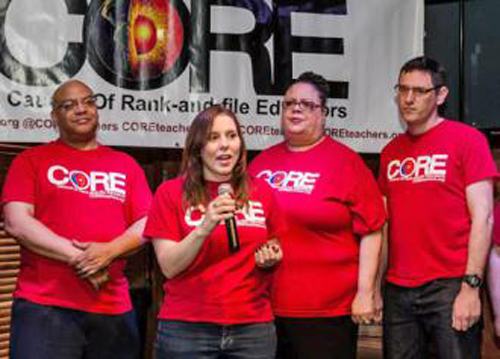 Above, the CORE candidates appeared at an election campaign kickoff at a West Side restaurant in April 2013, the year CORE won its second term to lead the Chicago Teachers Union. Above, left to right, Michael Brunson (incumbent Recoding Secretary at the time), Kristine Mayle (incumbent Financial Secretary at the time), Karen Lewis (incumbent President at the time), and Jesse Sharkey (incumbent Vice President at the time). Mayle announced she would not be a candidate in 2016 and has been replaced by Maria Moreno.The current leadership of the Chicago Teachers Union was swept into a third term in office when nobody filed nominating petitions to run against Karen Lewis, Jesse Sharkey, and the CORE slate. The union's House of Delegates voted unanimously at its April 6, 2016 meeting to forego the election, which would have been held on May 20. According to some union officials, the election would have cost $300,000, and most of that cost will be saved by the cancellation of the election. (A few contracts with vendors who are hired to conduct the election had to be signed and the union will pay for the cancellation of those).
Above, the CORE candidates appeared at an election campaign kickoff at a West Side restaurant in April 2013, the year CORE won its second term to lead the Chicago Teachers Union. Above, left to right, Michael Brunson (incumbent Recoding Secretary at the time), Kristine Mayle (incumbent Financial Secretary at the time), Karen Lewis (incumbent President at the time), and Jesse Sharkey (incumbent Vice President at the time). Mayle announced she would not be a candidate in 2016 and has been replaced by Maria Moreno.The current leadership of the Chicago Teachers Union was swept into a third term in office when nobody filed nominating petitions to run against Karen Lewis, Jesse Sharkey, and the CORE slate. The union's House of Delegates voted unanimously at its April 6, 2016 meeting to forego the election, which would have been held on May 20. According to some union officials, the election would have cost $300,000, and most of that cost will be saved by the cancellation of the election. (A few contracts with vendors who are hired to conduct the election had to be signed and the union will pay for the cancellation of those).
The third term for CORE means that for the first time in the 21st Century a union leadership group will be governing and leading the union for a third three-year term.
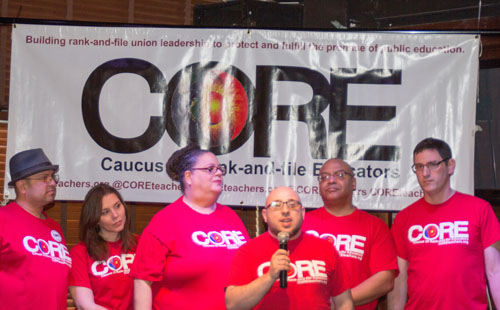 The CORE campaign in 2013 kicked off with a rally at the Haymarket Restaurant in March 2013. At that time, CORE was opposed by the Coalition to Save Our Union, which had already received the support of the Chicago Tribune (in the form of a front page article about the challenge to Karen Lewis and the union leaders who had led the Chicago Teachers Strike of 2012). Above, the CORE co-chairmen, Nate Goldbaum and Al Ramirez stand with the four officer candidates during the Haymarket rally. Left to right: Al Ramirez, Kristine Mayle, Karen Lewis, Nate Goldbaum, Michael Brunson, and Jesse Sharkey. Substance photo by George N. Schmidt.Since 2000, the union has seen a one-term leadership group (Debbie Lynch and PACT, the Pro Active Chicago Teachers and school workers) and a two-term leadership group (Marilyn Stewart and the New United Progressive Caucus, or "New UPC").
The CORE campaign in 2013 kicked off with a rally at the Haymarket Restaurant in March 2013. At that time, CORE was opposed by the Coalition to Save Our Union, which had already received the support of the Chicago Tribune (in the form of a front page article about the challenge to Karen Lewis and the union leaders who had led the Chicago Teachers Strike of 2012). Above, the CORE co-chairmen, Nate Goldbaum and Al Ramirez stand with the four officer candidates during the Haymarket rally. Left to right: Al Ramirez, Kristine Mayle, Karen Lewis, Nate Goldbaum, Michael Brunson, and Jesse Sharkey. Substance photo by George N. Schmidt.Since 2000, the union has seen a one-term leadership group (Debbie Lynch and PACT, the Pro Active Chicago Teachers and school workers) and a two-term leadership group (Marilyn Stewart and the New United Progressive Caucus, or "New UPC").
Lynch was President of the union from July 1 2001 through June 30, 2004.
Stewart was union president from July 1, 2004 through June 30, 2010.
CORE's leadership group took office on July 1, 2010. In addition to Karen Lewis and Jesse Sharkey, also returning from among the four elected officers is Michael Brunson, the CTU Recording Secretary. Kristine Mayle, who had served as Financial Secretary for two three-year terms, had previously announced that she was not seeking a third term. Mayle was replaced among the "top four" on the CORE slate by Maria Moreno, a clinician.
Chicago Teachers Union elections are among the most democratic and complicated anywhere. In addition to electing the four officers, a CTU election elects six trustees, three "area vice presidents," and one "functional vice president" for each 1,000 members in all of the major groups of union members (called "functional groups").
The six teachers who are now trustees are Lois Ashford, Bernice Eshoo, Michelle Gunderson, Brian Halberg, Albert Ramirez, and Tammie Vinson.
The area vice presidents are James J. Cavallero, Alexandra Gonzalez, and Gervais Clay.
The five high school functional vice presidents are Valerie Collins, Alison Eichorn, David Hernandez, Timothy Meegan, and Robert Pincham.
The 15 elementary functional vice presidents are Carrene Beverly-Bass, Sarah Chambers, Lydia Clark, Michael Flynn, Xian Franzinger Barrett, Kimberly Goldbaum, Joshua Lerner, Garth Liebhaber, Cieo Marquez Muno, Moselean Parker, Emily Penn, Nathan Rasmussen, Monique Redeaux, Nancy Serrano, and Tara Stamps.
The functional vice president for school clerks is Jose Jiminez.
The functional vice presidents for teachers (and other assistants) are Gloria Higgins and Lashawn Wallace.
The functional vice president library assistants, guidance counselor assistants, and other special assistants is Charlotte Sanders.
The functional vice president for vision screening and audiometric technicians and other technicians is Gloria Prince.
And the functional vice president for School Community Representatives is Karen Henry.
The union is also planning to amend the union's constitution and by-laws to add functional electoral groups for new groups that have been organized into the union. Over the years, the "functional groups" have been organized as the union has brought in new members to the bargaining unit and under the union's master contract.
The largest group of members, elementary teachers, has 15 functional vice presidents, followed by high school teachers, who this year are electing five functional vice presidents, the lowest in 30 years. The union currently has slightly more than 28,000 members, also the lowest in decades.
The election would also have chosen 150 delegates and 45 alternate delegates to the conventions of the American Federation of Teachers (AFT) and the Illinois Federation of Teachers (IFT). All 150 of those candidates were also elected by acclamation. [Disclosure: this reporter is a delegate to the conventions, having run on the CORE slate both in 2013 and would have in 2016 had the election not been cancelled. A number of other Substance staff members are also delegates].
Despite silly Tweeting by some and a few inaccurate reports in corporate news media, the election is being understood widely within the CTU, which is where it counts. Former Arne Duncan (and CPS) publicist Peter Cunningham tweeted that the CTU was being "undemocratic" by not holding an uncontested election. There was no reason for Cunningham to spout such ignorant nonsense, since by one phone call to former neighbors he could have gotten his facts straight.
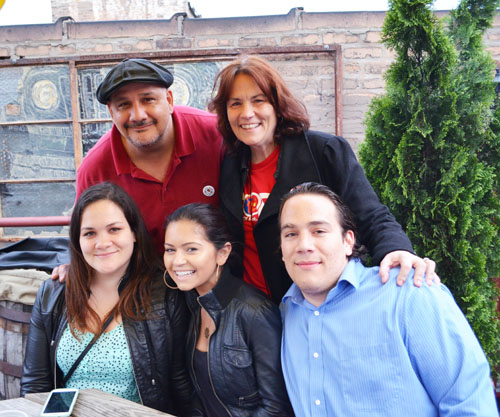 Sue Garza and her family were among the celebrants at Reggie's on May 17, 2013. After CORE won its second term, the union increased local political action, and several CTU members ran for alderman following the announcement by Karen Lewis that she would challenge Rahm Emanuel in the 2015 mayoral election. Garza was the one who emerged victorious, and is now alderman of the 10th Ward on Chicago's southeast side. Substance photo by George N. Schmidt.With the question of the CTU May election resolved, the union's members will now be confronting the major issues of political action and contract negotiations. The union's leaders (and "Big Bargaining Team") have been in negotiations with CPS officials (and expensive outside lawyers) since late 2014. The current contract expired on June 30, 2015, and CPS officials have been trying to exploit loopholes in the contract and the law since. Part of the problem facing the CTU in the current negotiations is the infamous SB7, which added to the infamous "Amendatory Act of 1995" chokes off many of the rights of Chicago's teachers.
Sue Garza and her family were among the celebrants at Reggie's on May 17, 2013. After CORE won its second term, the union increased local political action, and several CTU members ran for alderman following the announcement by Karen Lewis that she would challenge Rahm Emanuel in the 2015 mayoral election. Garza was the one who emerged victorious, and is now alderman of the 10th Ward on Chicago's southeast side. Substance photo by George N. Schmidt.With the question of the CTU May election resolved, the union's members will now be confronting the major issues of political action and contract negotiations. The union's leaders (and "Big Bargaining Team") have been in negotiations with CPS officials (and expensive outside lawyers) since late 2014. The current contract expired on June 30, 2015, and CPS officials have been trying to exploit loopholes in the contract and the law since. Part of the problem facing the CTU in the current negotiations is the infamous SB7, which added to the infamous "Amendatory Act of 1995" chokes off many of the rights of Chicago's teachers.
The union's communications department issued a brief press release on the re-election.
The CTU communications department also shared an introduction to the union's new financial secretary with the members in an email (April 8):
Chicago Teachers Union to welcome new financial secretary in July
BY CTU COMMUNICATIONS | 04/07/2016
CHICAGO—The Chicago Teachers Union (CTU) House of Delegates (HOD) voted overwhelmingly Wednesday night to cancel CTU elections due to there being only one slate of candidates for officer and executive board positions. The House, which noted substantial cost savings by cancelling an uncontested election, accepted the list of eligible candidates to be seated at the start of the new term on July 1, 2016, which means National Board Certified teacher Karen Lewis will retain her position as union president for the next three years. The other three officers will include Jesse Sharkey as vice president, Michael Brunson as recording secretary and Maria Moreno as financial secretary.
Moreno, a speech-language pathologist, delegate, executive board elementary functional vice-president and Big Bargaining Team member replaces special education teacher Kristine Mayle who chose not to seek re-election.
“My vision of the union is that it continues to encourage active participation of its members in the fight for our profession and the education our students deserve,” Moreno said. “The union must also continue establishing strong partnerships among parents, students, communities and labor organizations in our efforts to defend high quality, equitable public education for all students and address the social justice issues that hurt the people we serve as educators.”
Other news organizations also reported the event.
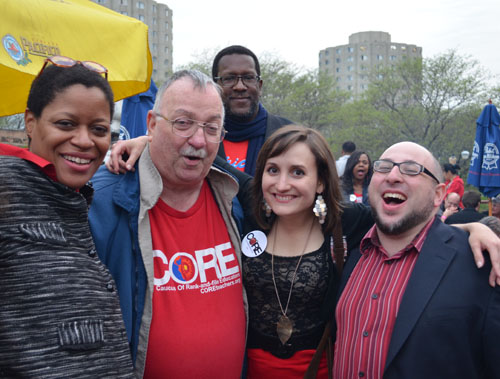 The rank and file CORE leadership that had just won the school-by-school victories that swept the CORE team into a second term in power celebrated at Reggie's on May 17, 2013, CTU Election Day. Despite the support from Chicago's Ruling Class -- including a last minute Op Ed in the Chicago Tribune against CORE and for the so-called "Coalition to Save Our Union" -- CORE won 80 percent of the vote. Above, during the celebration were some of the CORE leaders: Left to right, Kim Bowsky (see below, soon to be Kim Goldbaum), George Schmidt, Sarah Chambers, and Nate Goldbaum. Substance photo by Al Ramirez.CATALYST, APRIL 7, 2016:
The rank and file CORE leadership that had just won the school-by-school victories that swept the CORE team into a second term in power celebrated at Reggie's on May 17, 2013, CTU Election Day. Despite the support from Chicago's Ruling Class -- including a last minute Op Ed in the Chicago Tribune against CORE and for the so-called "Coalition to Save Our Union" -- CORE won 80 percent of the vote. Above, during the celebration were some of the CORE leaders: Left to right, Kim Bowsky (see below, soon to be Kim Goldbaum), George Schmidt, Sarah Chambers, and Nate Goldbaum. Substance photo by Al Ramirez.CATALYST, APRIL 7, 2016:
With no opposition, CTU cancels election and gives Lewis an automatic third term
By Melissa Sanchez, April 8, 2016, 19 hours ago
For the first time in at least two decades, the Chicago Teachers Union won’t have an election — because no one has filed to challenge popular CTU President Karen Lewis.
With no opposition against Lewis or any other candidates from the ruling Caucus Of Rank-and-file Educators (CORE) for the upcoming May elections, the slate was effectively granted another three-year term and the election has been cancelled.
Observers say the lack of organized opposition demonstrates members’ support for Lewis and her left-of-center caucus, which has taken on a broader “social justice” agenda and garnered support from activists outside the education sphere for last week’s “Day of Action.” The lack of opponents also legitimizes Lewis and CORE’s leadership at a time of contentious contract negotiations with the Board of Education, which encouraged teachers to break ranks for the Day of Action, a one-day strike.
“If you’re not being challenged, it typically signifies that there just isn’t any grassroots support for an alternative set of candidates,” says Robert Bruno, a professor at the University of Illinois at Urbana-Champaign’s School of Labor and Employment Relations who co-authored a forthcoming book about the 2012 CTU strike. “People are pleased with the direction that the union is going in.”
He added that Lewis, who battled with brain cancer last year but is back to work full time, is an inspiring and almost heroic leader to the rank and file. “Whether you agree with everything that she might support or say publicly, it’s hard not to be deeply moved by the level of personal investment,” he said. “People still need leaders. Organizations need strong leaders.”
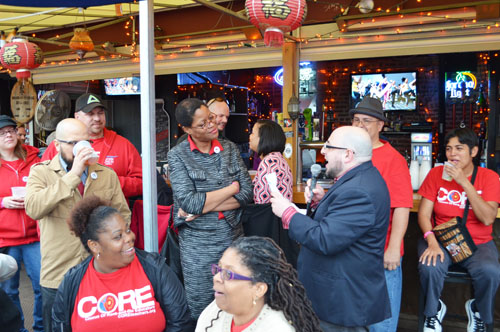 While more than 50 members of CORE waited for the winning candidates to join them at Reggie's on May 13, 2013, there were other celebrations. Nate Goldbaum (above right in glasses) proposed to Kim Bowsky during the celebratory event. One of the strengths of CORE is that its "rank and file" members spend time with each other at many events and on many projects -- not just during election seasons. Substance photo by George N. Schmidt.In addition to Lewis, two of the union’s three other officers will return for a third term: Vice President Jesse Sharkey and Recording Secretary Michael Brunson. Financial Secretary Kristine Mayle had previously announced that she would not seek a third term, citing personal reasons. In her stead, CORE nominated Maria Moreno, a speech pathologist who has worked for the district for 14 years.
While more than 50 members of CORE waited for the winning candidates to join them at Reggie's on May 13, 2013, there were other celebrations. Nate Goldbaum (above right in glasses) proposed to Kim Bowsky during the celebratory event. One of the strengths of CORE is that its "rank and file" members spend time with each other at many events and on many projects -- not just during election seasons. Substance photo by George N. Schmidt.In addition to Lewis, two of the union’s three other officers will return for a third term: Vice President Jesse Sharkey and Recording Secretary Michael Brunson. Financial Secretary Kristine Mayle had previously announced that she would not seek a third term, citing personal reasons. In her stead, CORE nominated Maria Moreno, a speech pathologist who has worked for the district for 14 years.
Nominating petitions — which had to include signatures from 5 percent of members — were due last week. But only CORE members filed the necessary paperwork to run for the positions of officers, area vice presidents or trustees. On Wednesday, the union’s House of Delegates voted to cancel the elections, meaning all those who filed to run for any position automatically won.
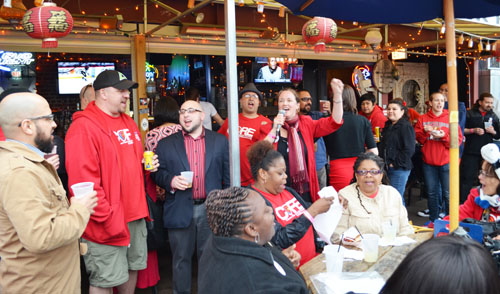 Michelle Gunderson led the singing, including Solidarity Forever, while the CORE members waited for the final vote count election results on May 17, 2013. Substance photo by George N. Schmidt.The lack of a union election will save CTU leadership time and energy during ongoing contract talks and the build-up to a potential general strike. A fact-finder is currently reviewing the most recent contract proposals from both sides and is expected to issue recommendations by April 16.
Michelle Gunderson led the singing, including Solidarity Forever, while the CORE members waited for the final vote count election results on May 17, 2013. Substance photo by George N. Schmidt.The lack of a union election will save CTU leadership time and energy during ongoing contract talks and the build-up to a potential general strike. A fact-finder is currently reviewing the most recent contract proposals from both sides and is expected to issue recommendations by April 16.
Sarah Chambers, an active CORE member who was automatically elected to the union’s executive board as an elementary teacher functional vice president, says nobody organized to run against the current leadership because “our membership trusts the leaders of the union. They trust Karen and Jesse.”
She adds: “They see we’re a fighting union. If you look around the country, there’s a lot of unions that are collaborationists. They collaborate with the boss instead of fighting back for what the members deserve.”
Opposition caucuses have disappeared
When CORE won its first election in 2010, there were four other caucuses running, including incumbent President Marilyn Stewart’s United Progressive Caucus (UPC) and former President Deborah Lynch’s Proactive Chicago Teachers (PACT).
In 2013, just one slate ran against CORE. The Coalition to Save Our Union — which included members of UPC and PACT — pledged to focus more on member services and rebuild the union’s bridges with district management. Lewis won re-reelection by a near four-to-one margin.
Since then, organized opposition to CORE within the union has largely fizzled out. In part that’s because many members who were previously involved in CTU politics with other caucuses have retired or otherwise left CPS.
Ted Dallas, a former vice president under Stewart who helped form a new caucus after he was pushed out of the UPC in 2010, says he’s surprised by how quiet House of Delegates meetings have become. Dallas, who is now retired, goes to meetings sometimes and sits in the visitors section.
“Nobody gets up and says anything negative. It’s kind of weird,” he says. “In all my years, there were a lot of unhappy people all the time. No matter how good a contract could be, somebody wasn’t happy.”
Dallas questions CORE’s political strategy and says he wishes CTU leaders focused more on direct member services — like benefits, working conditions and job security — instead of attacking the mayor.
“We never bashed any mayor,” he says. “Who we bashed was the Board of Ed. We actually worked with these people. I’m not saying we were like buddies. When we were behind closed doors, yelling, screaming, cussing, maybe almost coming to a fight. But I think that these guys have no relationship with the Board people and I think that’s part of the problem.”
Rosita Chatonda, a former teacher, CORE member and union organizer, tried to recruit disenchanted union members to organize a slate against CORE this year. But few were interested.
“At this point nobody wants to run the union anymore,” she says. “The union has no negotiating power. Because of SB 7, if you became union president you would get onto a sinking ship.”
Senate Bill 7, signed into law in 2011, curbed tenure rights for teachers and made it easier for school districts to fire teachers with poor evaluations. The law also makes it harder for teachers unions to go on strike.
George Schmidt, a longtime union activist who helped start CORE, says he expects there will be organized opposition to the union leadership by the next time union elections role around — in 2019.
Some of that opposition may even come from current caucus members who disagree with the leadership's strategies and focus, adds Schmidt, who publishes Substance News. That didn't happen this time around, though, in large part because of the contentious contract negotiations and broader political fights in the state. "We're in a war," he says. "We've got to stick together even when we have disagreements."
CHICAGO TRIBUNE REPORT: CTU cancels vote, handing President Karen Lewis a third 3-year term, By Juan Perez Jr. (Published on line April 7, 2016 and in the print edition of April 8, 2016)
Chicago Teachers Union President Karen Lewis, who gained national prominence with her leadership style and denunciations of MayorRahm Emanuel, won another three-year term without having to run.
The CTU's governing body voted to cancel an election for officers because of a lack of opposition to a slate led by Lewis and Vice President Jesse Sharkey, the union said Thursday.
Lewis' appointment to a third term allows the union to avoid a potentially distracting election during the final stages of contract negotiations with the Chicago Board of Education.
The lack of opposition to Lewis' candidacy also indicates she has consolidated power as the union mounts a populist challenge to Gov. Bruce Rauner's union-weakening agenda.
If Lewis, 62, completes the term she will approach the decadelong tenure of former CTU President Jacqueline Vaughn, a groundbreaking leader in the 1980s and early 1990s.
The union said the one CTU member who attempted a run against union leadership failed to secure the required number of signatures on nominating petitions. That led delegates to vote Wednesday to cancel an election that would have cost $300,000, according to the union.
Along with Lewis, Sharkey and recording secretary Michael Brunson will retain their positions for three-year terms beginning in July. Kristine Mayle, the leadership team's fourth member and union financial secretary, decided not to run for re-election and will be replaced by speech language pathologist Maria Moreno.
Chicago teachers rally in Loop to cap day of protests
Lewis' Caucus of Rank and File Educators "has really got hegemony," said Rodney Estvan, an education policy expert with the Access Living organization.
"They've got a lot of support amongst older and younger teachers," he said. "She's a charismatic figure, and they're not going to turn on her. That's not going to happen."
Lewis took office in 2010 and two years later led a seven-day strike after 25 years of relative labor peace between CTU and the city.
Last week, she led the CTU on a one-day walkout to draw attention to contract talks and the union's demand for a new education-funding formula for the state.
In late 2014, her bid to challenge Emanuel for mayor was derailed when she was diagnosed with a malignant brain tumor. Her health remains a delicate subject. She was hospitalized in March after experiencing a seizure.
"I overworked myself," she said a week later.
Wednesday's vote by the CTU's House of Delegates came as union officials deliberated how to respond to a fact-finder's report due later this month. If the union and the school board accept the fact-finder's conclusions, they would be incorporated into a new contract.
CAPTIONRally and march for Chicago Teachers Union
CAPTIONChicago teachers staged a one day walkout rallying throughout the city Friday
If either side rejects those findings, the fact-finder's report would be released publicly and teachers can move to strike after a monthlong waiting period. That process would wind up close to the end of the school year.
If agreement on a contract to replace one that expired June 30 still can't be reached, a strike could occur anytime — including this fall after the new school year begins.
The union's one-day strike last week prompted a CPS legal challenge to the Illinois Educational Labor Relations Board. The district argued union members are barred from striking outside the authority of a state law that governs contract talks between the school district and union.
In December, the union said that 88 percent of its members agreed to authorize union leaders to call a strike if a contract agreement cannot be reached. That's well above the 75 percent necessary under state law for a strike to occur.
Chicago Public Schools asked a state board controlled by Rauner, a union opponent, to invalidate the strike authorization vote.
The union's three-day voting process was "inherently flawed," school system attorneys argued to the Illinois Educational Labor Relations Board in December.
CPS also asserted the union could not vote on a strike until contract talks concluded.
That charge is still under investigation by the labor board, and no hearing date has been set.
CHICAGO SUN-TIMES REPORT:
CHICAGO 04/07/2016, 11:33am. on line, in print edition April 8, 2016.
Karen Lewis gets automatic third term after CTU cancels elections, By Lauren Fitzpatrick, Chicago Teachers Union delegates voted Wednesday night [April 6, 2016] to cancel upcoming elections after no one stepped forward to challenge president Karen Lewis, who automatically keeps her office for a third term.
The move was billed as a money-saver, CTU spokeswoman Stephanie Gadlin said, to spare members the $300,000 cost of elections in May that would merely have confirmed existing union leaders. The idea was floated at Wednesday night’s meeting of the House of Delegates, and then approved after no challengers appeared, Gadlin said.
Just one CTU member had circulated petitions to challenge the charismatic leader, who had just led a one-day strike last Friday, but failed to secure enough signatures. She was not part of any slate.
Along with Lewis, vice president Jesse Sharkey and recording secretary Michael Brunson also will continue in the leadership roles they’ve had since 2010. The fourth officer, Kristine Mayle, told the Chicago Sun-Times months ago she would not seek a third term as financial secretary.
Speech pathologist Maria Moreno, also a member of the Caucus of Rank and File Educators, or CORE, will take Mayle’s place.
“My vision of the union is that it continues to encourage active participation of its members in the fight for our profession and the education our students deserve,” Moreno said in a statement. “The union must also continue establishing strong partnerships among parents, students, communities and labor organizations in our efforts to defend high quality, equitable public education for all students and address the social justice issues that hurt the people we serve as educators.”
Lewis, who came back to work after a brain cancer diagnosis in October 2014, took an offer she considered “serious” to her 40-member big bargaining team in January, but they promptly and unanimously shot it down.
And when she asked the House of Delegates last month to walk out on April 1 in an unprecedented one-day strike over unfair labor practices and inadequate state funding, they consented 486-124, which was more than 2/3 but hardly the overwhelming mandate typical of the CTU.
“I have no idea why nobody ran,” Lewis said Thursday. “Perhaps because they didn’t want to come in the middle of negotiations?”
People trust the current leadership, said Sarah Chambers, a teacher and CORE member.
“Our members see us as a fighting social justice union that is fighting for all the teachers’ rights and students’ rights,” she said.
“CORE and CTU have created a movement in this city with a broad coalition of community organization,” she continued, saying that the union has “dethroned” Mayor Rahm Emanuel and gained power in Springfield, too, through candidates it has supported.
Nominating petitions were due last week. The CTU declined to say then who if anyone filed to challenge Lewis and her team, saying the House of Delegates would have to be told first.
CTU elections were scheduled to take place on May 20, just days after the union could legally launch a contract strike. Their cancellation will surely free up time and energy for CTU leadership still mired in an ongoing bargaining process.
Sharkey insisted elections had nothing to do with bargaining progress. Last month, he told the Sun-Times right before that vote that, “everyone is very united. We want a fair contract. We need revenue to get it.”
Negotiations currently sit in the hands of a fact-finder. His report will be made public later this month, and if both Board of Education and union approve, his recommendations will become the new contract to replace the one that expired in June

